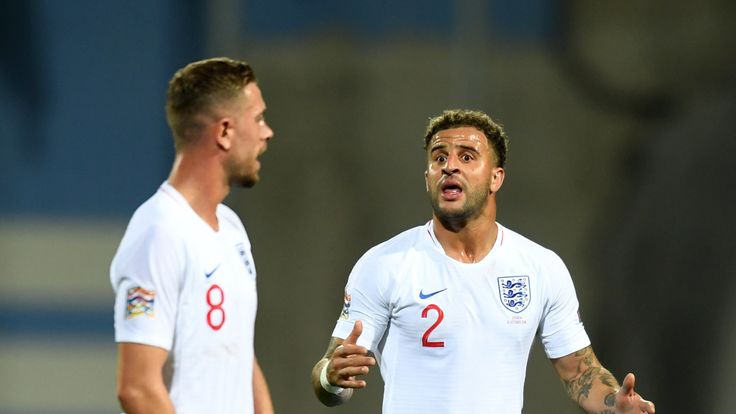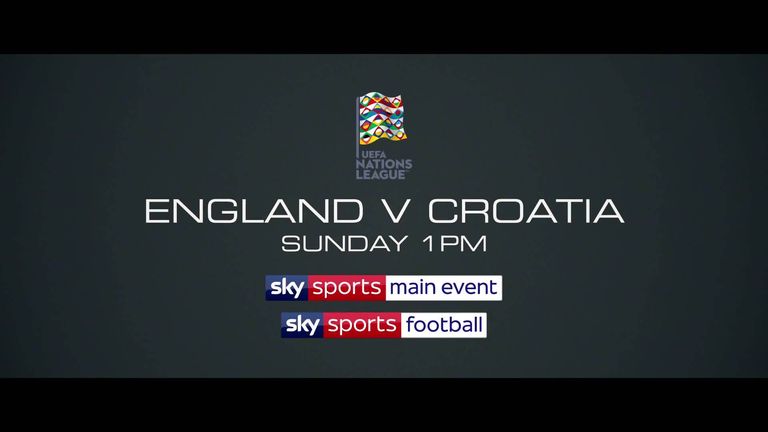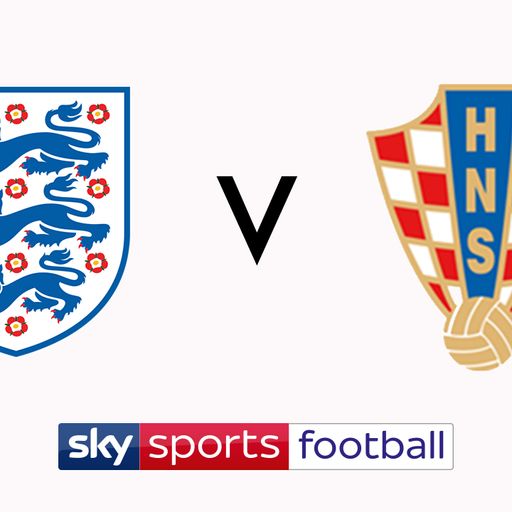What Nations League relegation would mean for England, Scotland and Republic of Ireland
England vs Croatia, 1pm, Sunday, Sky Sports Football HD

Friday 16 November 2018 16:38, UK
England, Scotland and Republic of Ireland all face the prospect of Nations League relegation this weekend. But what would that mean? We take a look...
Croatia's win over Spain on Thursday night means England face an all-or-nothing battle with their World Cup semi-final conquerors at Wembley on Sunday.
Win and England will leapfrog group-leaders Spain to reach next summer's finals. Lose and England will be relegated from the top tier of the Nations League.
A score draw would also see England drop from League A to League B, while a 0-0 would leave England safely in second spot, with Croatia dropping down.
Republic of Ireland are in an even more perilous situation, bottom of Group B4 and three points adrift of Denmark, who have a game in hand. They could go down without kicking a ball if Denmark beat Wales in their next match.
Trending
- Usyk denies Fury in intense world championship rematch
- Highlights: Usyk overcomes Fury in epic heavyweight rematch
- 'He got a Christmas gift!' | Fury left fuming in post-fight press conference
- Fury rages: I was robbed... Usyk got a Christmas gift!
- Littler tested on emotional Worlds return: 'Never felt anything like that'
- Papers: Arsenal, Man City and Bayern in three-way battle for Olmo
- Big fight reaction: What next for Fury and Usyk after contentious call?
- 'Uncle Frank is blind!' | Usyk responds to Fury complaints
- Dubois storms ring to demand undisputed Usyk 'revenge' fight
- World Darts Championship schedule: Anderson headlines Sunday's action
Scotland, meanwhile, have two to play and their fate in their own hands - although they are currently level on points with bottom-placed Albania in Group C1.
Northern Ireland's relegation from League B to League C has already been confirmed, while Wales cannot be relegated from their group.
What does relegation mean?
If England were to be relegated, the obvious initial impact would be Gareth Southgate's side having to face second-tier teams in the next edition of the Nations League in 2020/21.
Rather than glamorous clashes with the likes of Spain, England would be pitched against teams such as Finland or Austria.
That would be a blow for Southgate, who has spoken of the positive impact playing top sides has had on the development of his team.
Republic of Ireland and Scotland would also find themselves further away from UEFA's top table.
However, there are other implications, too.
In terms of qualification for the 2020 European Championships, the effects of Nations League relegation won't have an immediate impact, but it could subtly make the task all the more difficult.
In the new format, qualifiers for the next Euros will be crammed into 10 games played between March and November next year, with the top two qualifying for the 2020 tournament, as normal.
Where it could affect England, Republic of Ireland and Scotland is that relegation will damage their coefficient, which is how the seedings for the European Championship qualifiers will be decided when the draw is made on December 2.
This could therefore mean they are handed a rather difficult qualification group as a result. They will also have work to do in the next Nations League to repair the damage.
Euro 2020 qualification still possible through Nations League?
In the Euro 2020 qualification groups, the top two of each group will qualify for the Europe-wide tournament, with the four remaining places decided by Nations League play-offs.
The format will be one-off play-off semi-finals, followed by a final, per league, with the winning team from each of leagues A, B, C and D taking the last four spots at the Euros.
If a country has already qualified by the conventional route, their place will go to the next highest-ranked team from their respective Nations League tier.
Complicated, right? England would therefore be in League B, but that could mean tricky play-offs against Sweden, Turkey or Wales.
Qualifying the usual way would therefore be preferable, but with the potential detrimental effect on the coefficient relegation could bring, that could well be a challenge, too. All to play for, then.









